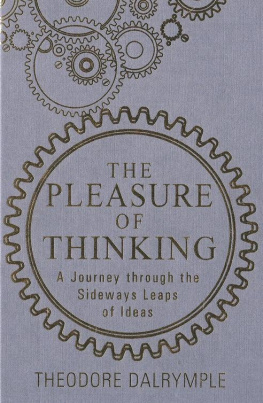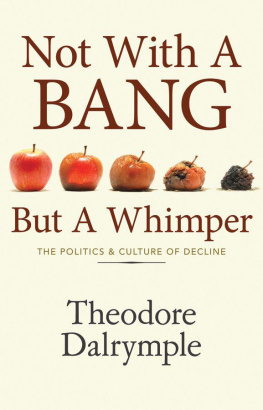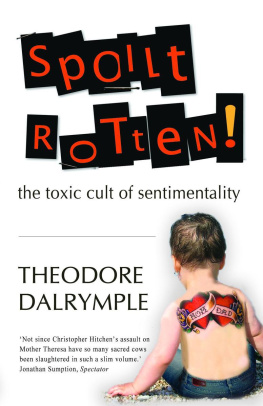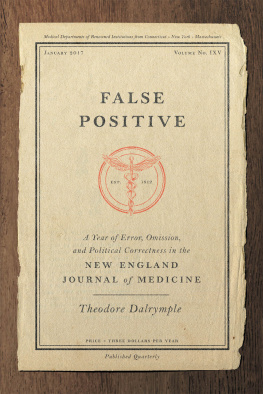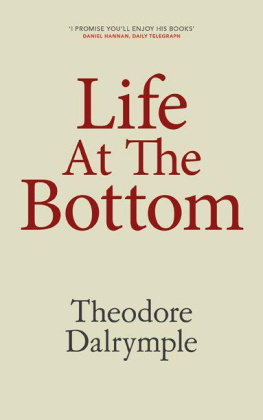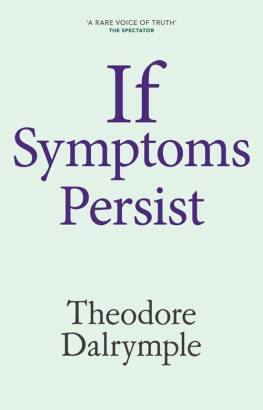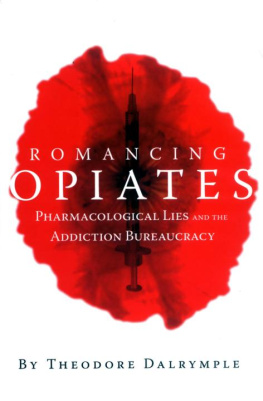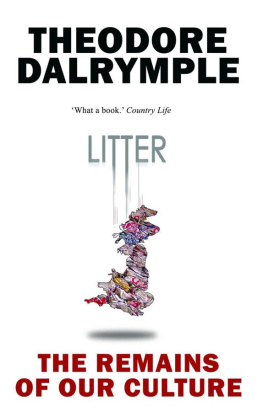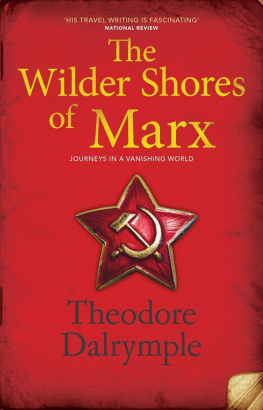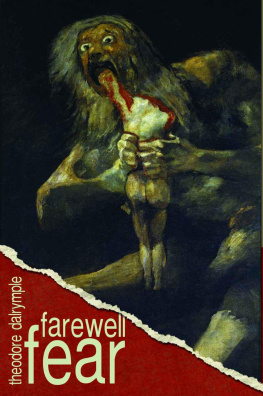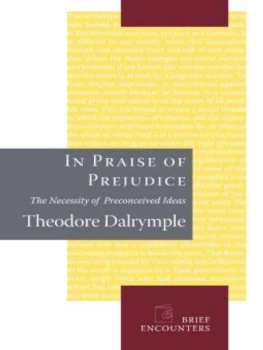Previous praise for Theodore Dalrymple
[A] cultural highlight.
Observer
Not since Christopher Hitchens assault on Mother Theresa have so many sacred cows been slaughtered in such a slim volume.
Jonathan Sumption, Spectator
One of our most celebrated essayists.
Toby Young, Mail on Sunday
Witty, always punchy and sometimes rapier-like.
Tom Adair, Scotsman
Characteristically brilliant.
Dominic Lawson, Sunday Times
A little oasis of sanity and truth.
Daily Mail
A rare voice of truth.
Spectator
Pleasurable tartness.
Guardian
Also by Theodore Dalrymple
Spoilt Rotten
Litter: the Remains of Our Culture
Theodore Dalrymple currently gives expert psychiatric assessments in murder trials. Previously he worked as a doctor in Africa and the Gilbert Islands. Upon his return to England, he worked as a psychiatrist and GP in a prison hospital in the Midlands, and the East End of London. He is a regular contributor to, among others, The Times, Telegraph and the British Medical Journal.
To Mr Stephen Wycherley,
who has sold me books for more than thirty years, this book is dedicated
The miseries of a vacant life were never known to a man whose hours were insufficient for the inexhaustible pleasures of study.
Edward Gibbon, Memoirs of My Life and Writings
When we read, we thereby save ourselves the greater part of the trouble of thinking. This explains our obvious sense of relief when we turn from our own thoughts to reading.
Arthur Schopenhauer, Parerga et Paralipomena
The bibliomania, or the collecting an enormous heap of books without intelligent curiosity, has, since libraries have existed, infected weak minds, who imagine that they themselves acquire knowledge when they keep it on their shelves. Their motley libraries have been called the madhouses of the human mind
Isaac dIsraeli, Curiosities of Literature
Brown varnished bookshelves lined the walls, filled with row upon row of those thick, heavy theological works which the second-hand booksellers generally sell by weight.
Aldous Huxley, Crome Yellow
Contents
Not long ago in Manchester, I entered a small bookshop with a few second-hand books. I picked up a slim volume with the less-than-enthralling title, Making Sense of the NHS Complaints and Disciplinary Procedures, published in a series called The Business Side of General Practice. I cannot now recall what induced me to pick up such a volume, but I was soon glad that I did.
In the foreword, Sir Donald Irvine, the then-president of the General Medical Council, the disciplinary body that supervises the medical profession in Great Britain, wrote:
Patients today are seeking better protection from poorly performing doctors
Inside the book was a slip of paper from the Small Practices Association, asking for a review of the book for its professional journal.
The reviewer asked was Dr Harold Shipman, and his review was due six months before he was arrested for having murdered many patients.
I know from the greying of the edges of such a book when it has been read from cover to cover, and this book had been read in such a fashion. It is unlikely that anyone other than Dr Shipman had ever read it.
I bought it for five pounds, with Somerset Maughams question to those who think they are superior because they read incessantly, from the beginning of his short story, The Book-Bag , ringing in my minds ear:
From the standpoint of what eternity is it better to have read a thousand books than to have ploughed a thousand furrows?
In 1794 Xavier de Maistre, younger brother of Joseph, the great reactionary philosopher, published his Voyage autour de ma chambre, Journey Round my Bedroom. In it he said:
When I travel through my room, I rarely follow a straight line: I go from the table towards a picture hanging in a corner; from there, I set out obliquely towards the door; but even though, when I begin, it really is my intention to go there, if I happen to meet my armchair en route, I dont think twice about it, and settle down in it without further ado.
The journey towards the door continues
My copy of Somerset Maughams first book, Liza of Lambeth, has the small and neat inscription , E.S. Labouchre, in it. Labouchre is not a common name and I suppose or rather I like to suppose that E.S. was some relative of Henry, the liberal politician and journalist.
The latter, born to immense wealth, ran up debts to 6000 (equivalent today of perhaps 500,000) while a student at Cambridge. An idler and a gambler in his early life, his family got him accepted in the Foreign Office without his knowledge. Offered the Second Secretaryship at the embassy in Buenos Aires while he was playing roulette at Baden Baden at about the same time as Dostoyevsky, he replied that he would accept the job on one condition only: that he could fulfil his duties from Baden Baden.
Henry Labouchre owes such undying fame in literary history as he possesses to something uncharacteristic of him. Although a radical liberal in politics, anti-imperialist and favourably disposed to Irish nationalism, as well as unconventional in his private life, it was he, as a Liberal MP, who introduced and argued for the clause in the Criminal Justice Amendment Act of 1885 under which Oscar Wilde was prosecuted in the following decade.
What E.S. thought of all this I cannot say, of course. The copy of Liza of Lambeth is a second, not a first edition, but published in the same year as the first, 1897, when Maugham was still a medical student. I came across it for sale for two pounds in a small bookshop run in what is now euphemistically called an inner city. (Frankness and plain speaking about things formerly taboo, it seems, is always accompanied by the erection of new taboos elsewhere .)
The shop was owned and run by a communist of the Enver Hoxha faction, a member of a small but select band of harmless fanatics. Albania was his Valhalla. He ran the shop half as a business and half as a missionary enterprise to the local population, whom he hoped to convert to the Albanian road to socialism. He had a technical vocabulary which was especially rich in terms of abuse, but not vulgar abuse.
For example, anyone associated with or supporting the Labour Party was a Labourite. The scorn with which he managed to imbue this word, without however any excess of emphasis, was quite something to experience, and was a triumph of intonatory implication. He hated the Labourites (indeed anyone whose appellation ended in the suffix ites, for example the Titoites and the Khrushchevites) much more than the Tories. The latter were good old-fashioned class enemies, whom one could respect or even pity in a way, for they were on the losing side of history, but the Labourites were class traitors, much worse than mere enemies. They confused the potentially revolutionary proletariat with ideas of reform, to say nothing of bread and circuses. The local council being in the control of the Labourites, he was always in dispute with it.
It was a matter of deep regret to him that it was a member of the relatively moneyed middle classes in short, I who was much his best customer. Indeed, as far as I could tell his stock scarcely varied until, that is, it grew smaller by of my purchases.
The local population was not very literary in its pursuits. He would have been hard put to find a less auspicious place, the low rent notwithstanding, for a second-hand bookshop. The passing trade was all but nil, and he refused, on ideological grounds, to advertise. On the other hand, the lack of interest did make him relatively immune to shoplifting and burglary . He could put books outside on a shelf outside his shop and no one would take them. He would probably have had to pay people to do so.

